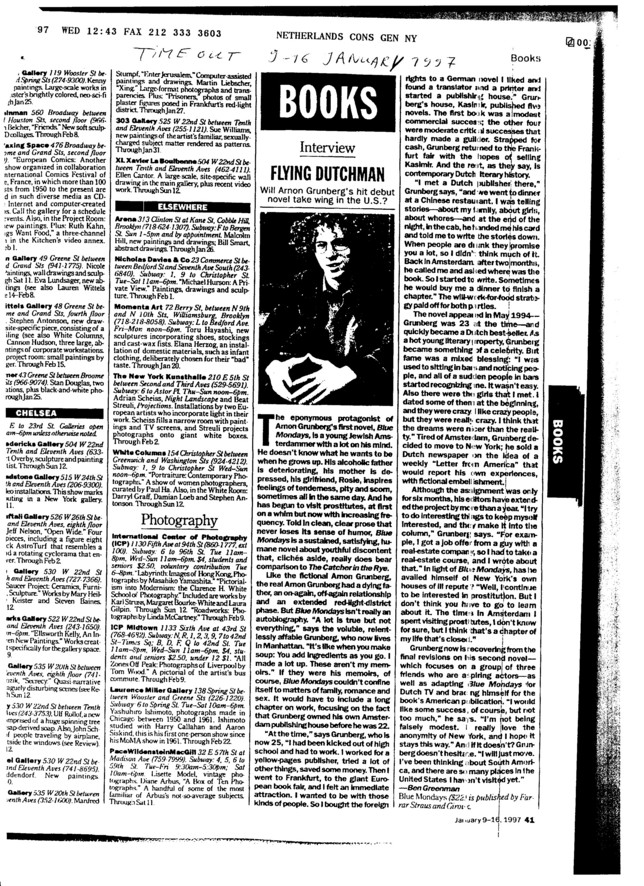Flying Dutchman. Will Arnon Grunberg's hit debut novel take wing in the U.S.?
Ben Greenman
Although the assignment was only for six months, his editors have extended the project by more than a year. "I try to do interesting things to keep myself interested, and they make it into the column," Grunberg says. "For example, I got a job offer from a guy with a real-estate company ", so I had to take a real-estate course, and I wrote about that." In light of Blue Mondays, has lie availed himself of New York's own houses of iII repute? "Well, I continue to be interested in prostitution. But I don't think you have to go to learn about it. The times in Amsterdam I spent visiting prostitutes, I don't know for sure, but I think that's a chapter of my life that's closed."
Grunberg now Is recovering from the final revisions on his second novel— which focuses on a group of three friends who are aspiring actors—as well as adapting Blue Mondays or Dutch TV and bracing himself for the book's American publication. "I would like some success, of course, but not too much," he says. "I'm not being falsely modest. I really love the anonymity of New fork, and I hope it stays this way." And if it doesn't? Grunberg doesn't hesitate. "I will just move. I've been thinking about South America, and there are so many places in the United States I haven't visited yet."
The eponymous protagonist of Arnon Grunberg's first novel Blue Mondays, is a young Jewish Amsterdammer with a lot on his mind. He doesn't know what he wants to be when he grows up. His alcoholic father is deteriorating, his mother is depressed, his girlfriend, Roste, inspires feelings of tenderness, pity and scorn, sometimes all In the same day. And he has begun to visit prostitutes, at first on a whim but now with increasing frequency. Told in clean, clear prose that never loses Its sense of humor, Blue Mondays Is a sustained, satisfying, humane novel about youthful discontent that, clichés aside, really does bear comparison to The Catcher in the Rye. Like the fictional Amort Grunberg, the real Amon Grunberg had a dying father, an on-agaln, off-again relationship and an extended red-light-district phase. But Blue Mondays isn't really an autobiography. "A lot is true but not everything," says the voluble, relentlessly affable Grunberg, who now lives in Manhattan. "It's like when you make soup: You add ingredients as you go. I made a lot up. These aren't my memoirs.'' If they were his memoirs, of course, Blue Mondays couldn't confine itself to matters of family, romance and sex. It would have to include a long chapter on work, focusing on the fact that Grunberg owned his own Amsterdam publishing house before he was 22. "At the time," says Grunberg, who is now 25, "I had been kicked out of high school and had to work. I worked for a yellow-pages publisher, tried a lot of other things, saved some money. Then went to Frankfurt, to the giant European book fair, and I felt an immediate attraction. I wanted to be with those kinds of people. So I bought the foreign rights to a German novel I liked and found a translator and a printer and started a publishing house." Grunberg’ s house, Kasimir, published five novels. The first book was a modest commercial success, the other four were moderate critical successes that lardly made a guilder. Strapped far cash, Grunberg returned to the Frankfurt fair with the hopes of selling Kasimir and the rent, as they say, is contemporary Dutch literary history.
"I met a Dutch publisher there," Grunberg says, "and we went to dinner at a Chinese restaurant. I was telling stories—about my family, about girls, about whores—and at the end of the night, in the cab, he handed me his card and told me to write the stories down. When people are drunk they promise you a lot, so I didn't think much of it. Back In Amsterdam after two months, he called me and asked me where was the book. So I started to write. Sometimes he would buy me a dinner to finish a chapter." The will-work-for-food strategy paid off for both parties.
The novel appeared in May 1994— Grunberg was 23 at the time—and quickly became a Dutch best-seller. As a hot young literary property, Grunberg became something as a celebrity. But fame was a mixed blessing: "I was used to sitting in bars and noticing people, and all of a sudden people in bars started recognizing me. It wasn't easy. Also there were the girls that I met. I dated some of them at the beginning, and they were crazy. I like crazy people, but they were really crazy. I think that the dreams were nicer than the reality." Tired of Amsterdam, Grunberg decided to move to New York; he sold a Dutch newspaper on the idea of a weekly "Letter from America" that would report his own experiences, with fictional embellishment.
